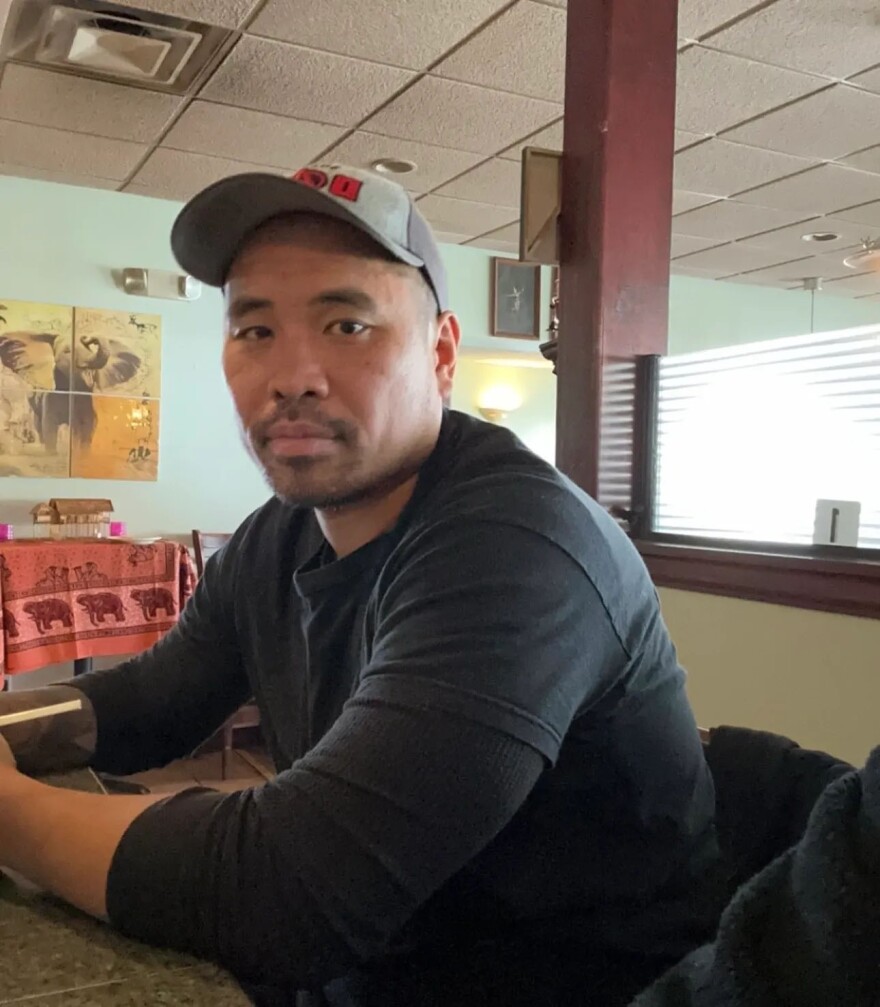When two Providence men were detained and deported to Laos in May, their wives were left feeling helpless and without a path forward.
The two women – Cassie Souvannaxa and Tina Phommachan – didn’t know each other well until this year. That changed when they started visiting their husbands at the Wyatt Detention Center in Central Falls, which holds people in federal custody.
“We would talk and have a conversation before it was time for us to go in and see our guys,” Tina said.
Their husbands both came to the U.S. in the 1980s as children with refugee status. Their families were fleeing the violence in Laos stemming from the Vietnam War.
Later, both men served time as teenagers in U.S. federal prison. After they got out, each had a standing deportation order, meaning they didn’t have a clear path to citizenship. And that appears to be why they were swept up in the Trump Administration’s push to deport non-citizens.
Tina said she was shocked when she learned that her husband, Manoutham Phommachan, had been detained after immigration agents showed up at their home at the end of December, prior to the start of President Trump’s second term. She was told by attorneys that there was very little she could do to halt the deportation of her husband.

Cassie’s husband, Vanhhatdy Souvannaxa, was detained at his annual check-in with immigration authorities, which he had been conducting without issue since he was a teenager. Cassie waited for her husband outside the immigration office during his meeting, only for Vanhhatdy to text her that he had been detained and was going to be transferred to the Wyatt Detention Facility.
And while she was glad to see him again at the detention center, she said she couldn’t even hold his hand.
“It was still hard to talk to somebody through a phone and look at them through glass,” Cassie said. “You know, somebody who has already done their time, and they’re still treated like a criminal.”
Cassie and Tina’s husbands were deported to Laos on May 25 – two of more than 100 Southeast Asians across the nation that have been deported to Laos or Vietnam since inauguration day. It was the first time either man had been to Laos. Cassie, who is Laotian-American, said her husband was born in a refugee camp in Thailand.
“They left when he was one, so he pretty much knows nothing of it,” Cassie said. “So he’s never stepped foot in Laos until now.”
Tina, who is Cambodian-American, said being separated from her husband has been tough.

“I started to feel really lonely. You know, we’ve never been apart,” Tina said. “I couldn’t communicate with anyone. I couldn’t do much, not having him there. It’s been really difficult.”
Both women work full-time jobs in healthcare, but with their husbands sent to Laos, they have less help to care for their children and pay their bills. Cassie said she frequently has to call on family members for support, and the situation has been stressing out her daughter.
“She’s trying to be considerate of the fact that everybody’s busy and she doesn’t want to take time from people,” Cassie said. “But she’s just a kid.”

But, through it all, Tina and Cassie talk or spend time with each other nearly every day.
“If I didn’t have her every day, I wouldn’t be able to be strong, able to do things every day,” Tina said. “Just talking to her, it makes me feel better.”
Cassie said there were days so hard she nearly lost hope of reuniting with her husband.
“There was a day that I gave up. I was like, ‘I’m not doing this anymore. I’m over this,’” Cassie said. “And [Tina] walked me through it. She helped me through it.”
Tina said she didn’t even know about her husband’s arrival in Laos if it wasn’t for Theary Voeul, the Deportation Defense director of the Providence Youth Student Movement (PrYSM), an immigrant assistance organization focused on supporting Southeast Asians. Voeul said PrYSM is working with the families of 89 people who have been detained by immigration agents – and the organization sees new cases nearly every day.

“Every week there’s someone getting picked up” by U.S. Immigration & Customs Enforcement, Voeul said. “We went from supporting and building up impacted members’ leadership skills to actually doing rapid response — connecting folks to lawyers, helping families navigate through the systems, helping families fundraise for legal fees. It’s been a challenging time.”
Laos doesn’t appear to have the necessary infrastructure to receive deported immigrants, Tina said. So Voeul and PrYSM have been helping the women navigate the immigration system since their husbands’ detention. And, Cassie said, it helps to have Tina by her side.
“It brings a little comfort,” Cassie said. “Knowing that you’re not alone in it. You know, there’s somebody that you can kind of lean on.”
Cassie and Tina are currently in Laos visiting their husbands. Born and raised in the U.S., the women say they’re daunted by the possibility of uprooting their families, but it’s not clear if their husbands will be able to return. Whatever happens, they’re facing the hurdles together as they come – day-by-day.
This story was originally published by The Public's Radio. It was shared as part of the New England News Collaborative.







